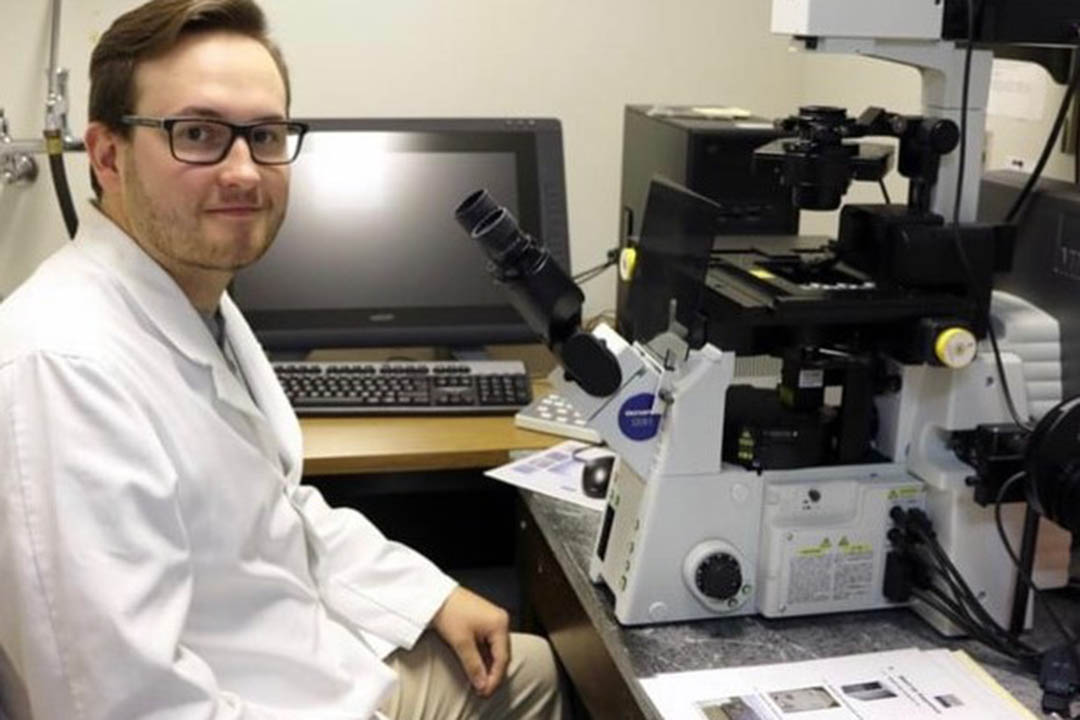
Young Innovators: USask researcher crosses biological boundaries to discover insights into multiple sclerosis
PhD candidate Cole Libner and his research team have tackled the question of how to decelerate or halt the devastating neurodegeneration caused by MS.
By Brooke KleiboerThe prevalence of multiple sclerosis (MS) in Saskatchewan and Canada has been a long-standing concern for health care professionals. MS has no known cure, and researchers have puzzled over how to slow its progression in the body.
University of Saskatchewan (USask) PhD candidate Cole Libner and his College of Medicine research team have tackled the question of how to decelerate or halt the devastating neurodegeneration caused by MS. The team is doing this by addressing the disease’s autoimmune component — where the immune system attacks the body’s own cells.
About 240 out of every 100,000 people in Canada are living with MS, including 3,700 Saskatchewan residents — reflecting some of the highest rates of MS in the world.
The disease is characterized by inflammation in the central nervous system causing death and damage to nerve cells in the brain and spinal cord. The damage to nerve cells causes them to progressively lose function, which leads to physical and cognitive impairments.
“Our research has implicated a protein — called A1 — that is highly expressed within nerve cells of the brain and spinal cord and when it becomes dysfunctional, it can lead to nerve cell death,” Libner said.
Libner and his research team used a group of experimental mice to simulate the internal environment of an MS patient’s body, by injecting similar antibodies. They then used laboratory imaging for observation and were able to see the immune cells (antibodies) physically entering the nerve cells containing the A1 proteins and causing further damage.
“The observation of these antibodies entering nerve cells is an important finding as this concept is often overlooked and not usually considered as an important contributor to nerve cell damage in MS,” Libner said.
The finding allows research scientists and clinicians to develop a deeper understanding of how and under what conditions nerve cells are affected by antibodies during disease progression.
“We are studying mechanisms of neurodegeneration which, if successful, could potentially lead to the generation of therapies that will prevent or halt neurodegeneration and thus the progression of the disease,” Libner said.
Libner has published academic papers on the subject in the Journal of Comparative Neurology, along with co-authors Hannah Salapa and Dr. Michael Levin (PhD), and in the International Journal of Molecular Sciences.
“Now that we know these autoantibodies can enter and have detrimental effects on nerve cells of the brain and spinal cord, the next steps are to determine ways of halting or preventing this damage.”
Libner’s research is supervised by Levin, a professor of neurology in the USask College of Medicine and the Saskatchewan Multiple Sclerosis Clinical Research Chair, who has dedicated a large portion of his career to research and discovery related to MS.
After completing his PhD research in June 2022, Libner plans to attend the USask College of Medicine Doctor of Medicine (MD) program beginning in August 2022, with plans to become a clinician scientist.
“I have been lucky enough to shadow Dr. Levin in the Saskatoon MS clinic where I have seen first-hand the need for this research,” Libner said. “Being able to make the connection between our research and the downstream applications of it keeps driving me forward.”
Libner received the Canadian Institutes of Health Research Frederick Banting and Charles Best Graduate Scholarship Doctoral Award to support the continuation of his PhD work. The research has also been funded by the Saskatchewan Health Research Foundation and the Saskatoon City Hospital Foundation.
This article first ran as part of the 2021 Young Innovators series, an initiative of the USask Research Profile and Impact office in partnership with the Saskatoon StarPhoenix.
Brooke Kleiboer is a communications student intern in the USask Research Profile and Impact unit.

